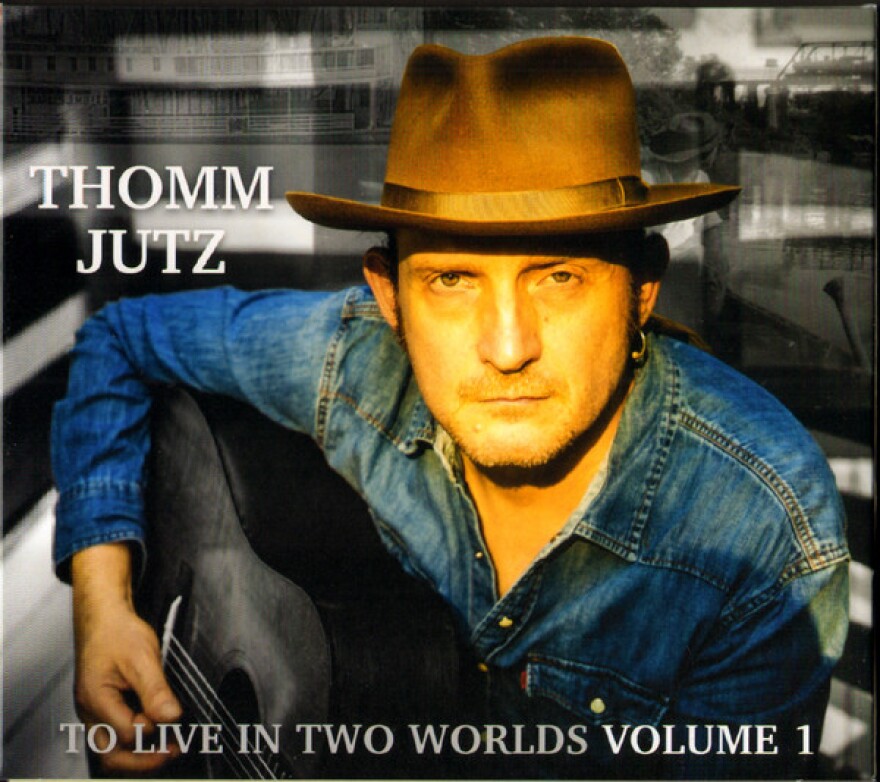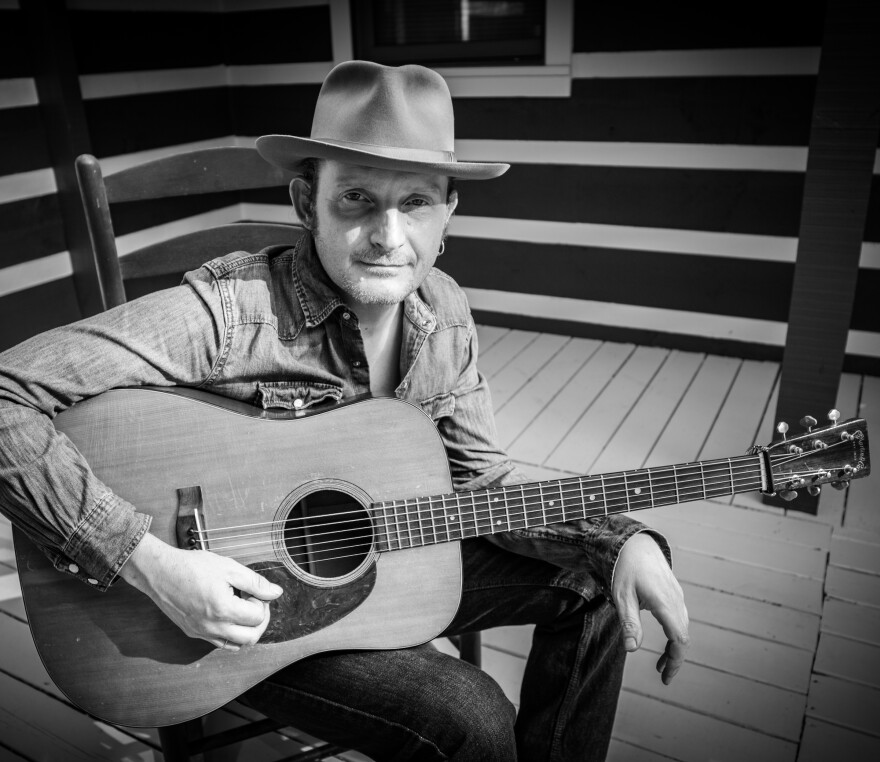Working from home is nothing but natural for Thomm Jutz. In March, coronavirus forced the songwriter, artist and producer to cut short a UK tour with East Nashville’s Eric Brace, but being settled in since then with his wife, his library, his guitars and his studio is just fine by him. The traffic of world-class artists coming to his Mt. Juliet, TN abode to make records is on pause, but he’s got plenty to keep him busy, including recording a conversation with WMOT about his unique path to the top tiers of bluegrass and acoustic music and a pair of new albums, the first of which is out now.
Listen to the full interview here in two parts:
To Live In Two Worlds, Volume 1 is Jutz’s second album as a solo artist but that would be a deceptive index of a prolific and quietly influential career that spans 17 years in Nashville. His songs have been widely recorded by roots music standouts, including Kim Richey, Nanci Griffith, Balsam Range, The Steeldrivers and Chris Jones. The fall of 2019 saw him nominated as International Bluegrass Music Association Songwriter of the Year for the third consecutive time. His studio has played host to country music royalty, including Marty Stuart, John Prine and Sierra Hull. Jutz was a producer on the magisterial 1861 Project, a three-volume, multi-artist set of contemporary songs about the Civil War that came out between 2011 and 2014. And he’s recorded and toured widely with Eric Brace and Peter Cooper as a roots trio. Jutz and Cooper also co-wrote and co-produced the vitally important I Sang The Song, the final recording by Country Music Hall Of Famer Mac Wiseman. That’s part of the resume anyway.
This and more makes Thomm Jutz without a doubt, the most significant German-born American bluegrass and roots musician at work today, if not ever. When I spoke with him in late 2017 for The String, we went over his unusual Americana bio, which starts for our purposes when, as an 11-year-old growing up in Buehl, Germany, he stayed up past his bed time to watch a German country music variety show, complete with house band and square dancers. It was guest star Bobby Bare singing “Detroit City” that captivated Thomm, launched a love affair with the acoustic guitar and set him on a twisting path toward Nashville. He and his wife snagged a U.S. visa by lottery, moved in 2003 and are now citizens.

With his success writing for the bluegrass market, Jutz got involved with Mountain Home Music Company outside of Asheville, NC. First it was a song publishing deal, and then the company asked him to make records for them. He pitched them a pair of projects, a full-bodied bluegrass album with a solo acoustic songwriter project to follow.
“In May of last year, I made the band record, which was pretty much my dream band of all time,” he says. That involved Tammy Rogers of the Steeldrivers on fiddle, Justin Moses on banjo, Mark Fain on bass and Mike Compton on mandolin. “I’ve been obsessed with Mike Compton’s mandolin playing for the last couple of years. I wanted to make a bluegrass record that was a little more reminiscent of a string band record, just having that slight influence, and as soon as you add Mike to the mix, you’ve pretty much got that.”
A couple weeks after those sessions, Jutz took some guitars back to Asheville and cut the solo acoustic album. When he and the label listened back to both, they were happy with the results, but the strategic downsides of issuing an energetic band album to bluegrass-friendly radio stations and then quickly following with a spare solo album dawned on them. So they blended the material together. You scarcely notice it as it plays, but Volume 1 alternates between band and solo tracks. The effect is seductive and carries the energy along. What also carries the record is the subject matter, with its many songs about or inspired by historic musical figures.
The brisk and full-bodied opening track “Mill Town Blues” visits the world of early 20th century banjo player, singer and wild man Charlie Poole who influenced Earl Scruggs and who died of alcohol poisoning. “Where The Bluebirds Call” is about seminal folk musicologist Cecil Sharp, an Englishman who discovered that old English songs that had vanished from the UK were alive and evolving in the mountains of the United States. Jutz claims a spiritual kinship with this bygone gentleman. He also sings about Blind Alfred Reed and Jimmie Rodgers and about John Hartford and about a curious character from the Civil War who wasn’t even a soldier but a victim of circumstances so fantastical you couldn’t made them up. But Jutz sticks to pretty honest and accurate versions of history, the history of a country he adopted.
“I started listening to bluegrass related music when I was probably around 14 or 15 and also I had to take English lessons starting at the age of 11, so I was around the language a lot,” he explains. “And I had a good teacher who led me to good literature and good music. And my wife had lived in the states as a child, so she was a big influence on me in helping to understand American culture better. . .I’m not an academic, and I’m not a scholar, and I’m not a historian. I’m more like a Beagle hound. When I smell something that’s interesting to me, I follow it. And I get pretty obsessed about it.”
We talk about those passions, his approach and the variety of commercial music he composes to maintain his passion projects in the conversation posted here. To Live In Two Worlds Volume 2 arrives this Fall.
From the album, "Mill Town Blues" written by Thomm Jutz and Milan Miller.



